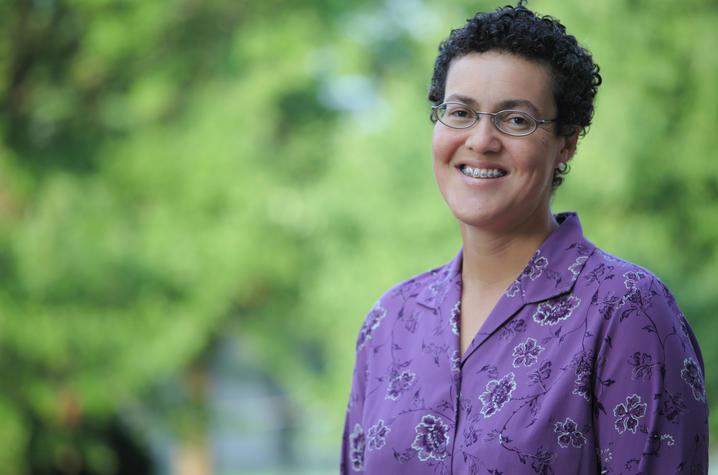By Jay Blanton
 LEXINGTON, Ky. (Aug. 5, 2020) — University of Kentucky President Eli Capilouto and faculty leaders in the African American and Africana Studies (AAAS) program on Wednesday announced the establishment of the proposed Commonwealth Institute for Black Studies — a multidisciplinary program that will highlight UK’s growing research around issues of race and racism.
LEXINGTON, Ky. (Aug. 5, 2020) — University of Kentucky President Eli Capilouto and faculty leaders in the African American and Africana Studies (AAAS) program on Wednesday announced the establishment of the proposed Commonwealth Institute for Black Studies — a multidisciplinary program that will highlight UK’s growing research around issues of race and racism.
Capilouto and AAAS faculty on Thursday announced an initial $250,000 investment as seed money to leverage additional investment to help the institute move forward with a critical series of initiatives. The creation of a new institute, ultimately, must receive approval from UK’s University Senate.
The interdisciplinary institute will establish research clusters across the campus and promote UK’s growing research and scholarship on topics of importance in African history and African American history, such as slavery and the quest for freedom, racial discrimination and violence, and the long struggle for civil rights.
“The challenge of systemic racism is one of the twin pandemics confronting our country,” Capilouto said. “To this challenge, we bring a growing cadre of talent among faculty who are working across the broad spectrum of issues confronting Black, Indigenous and people of color in our community, our state and our country. The Commonwealth Institute will serve as an intellectual home and base of support for this critical work.”
“The new Commonwealth Institute for Black Studies at the University of Kentucky is an epicenter for cutting-edge research on people of African descent worldwide,” said Anastasia Curwood, a history professor and director of the African American and Africana Studies program.
“The Institute is for everybody at the University and in the Commonwealth of Kentucky, and our reach is international … We advise and develop antiracist solutions to the most urgent issues of our pressing moment in collaboration with University leadership,” said DeMaris B. Hill, an English professor who will be interim director of the African American and Africana Studies program for this upcoming year while Curwood is completing a book project about Shirley A. Chisholm, the first Black woman elected to the U.S. Congress.
Specifically, the initial investment of dollars will also support:
- The annual Black Women’s Conference, which draws attention to scholarship produced throughout the campus.
- The new “1619, Slavery and UK” project that will examine the university’s early history, its connections to slavery and its location on land previously owned by Indigenous peoples.
- Faculty research clusters and working groups for Black Studies scholars at work on topics that impact Kentucky and the Appalachian region, including Affrilachian Studies, Slavery Studies, and Rural Studies; and research clusters (including: women and gender, the long Black freedom struggle, visual and popular culture, and policing/mass incarceration.
- Faculty, graduate student and undergraduate research grants.
- Postdoctoral and predoctoral fellows, both internal to UK and with the goal of bringing promising new scholars to the campus for fellowships.
- A robust internship program for undergraduate and graduate students.
- Expansion of public programming and sponsorship of community conversations about race, inequality and history in Kentucky and beyond.
Capilouto and AAAS faculty pointed out that the COVID-19 crisis has underscored the disparities Black, Indigenous and people of color confront in terms of disparities in health care and quality of life.
The Commonwealth Institute will be housed within UK’s African American and Africana Studies program in the College of Arts and Sciences and will seek support from — and collaboration with — the new UNITE Research Priority Area, which also was announced Wednesday.
“We cannot understand where humanity has been and where we’re going without Black Studies,” Curwood said. “The Commonwealth Institute for Black Studies provides multifaceted insight. At the University of Kentucky, Black Studies matter.”
The initiatives are part of a series of steps and programs being announced as part of UK’s comprehensive Diversity, Equity and Inclusion effort, in which more than 500 members of the university community are now engaged. You can read more about that initiative here: https://www.uky.edu/president/diversity-equity-and-inclusion.
The University of Kentucky is increasingly the first choice for students, faculty and staff to pursue their passions and their professional goals. In the last two years, Forbes has named UK among the best employers for diversity, and INSIGHT into Diversity recognized us as a Diversity Champion three years running. UK is ranked among the top 30 campuses in the nation for LGBTQ* inclusion and safety. UK has been judged a “Great College to Work for" two years in a row, and UK is among only 22 universities in the country on Forbes' list of "America's Best Employers." We are ranked among the top 10 percent of public institutions for research expenditures — a tangible symbol of our breadth and depth as a university focused on discovery that changes lives and communities. And our patients know and appreciate the fact that UK HealthCare has been named the state’s top hospital for four straight years. Accolades and honors are great. But they are more important for what they represent: the idea that creating a community of belonging and commitment to excellence is how we honor our mission to be not simply the University of Kentucky, but the University for Kentucky.
